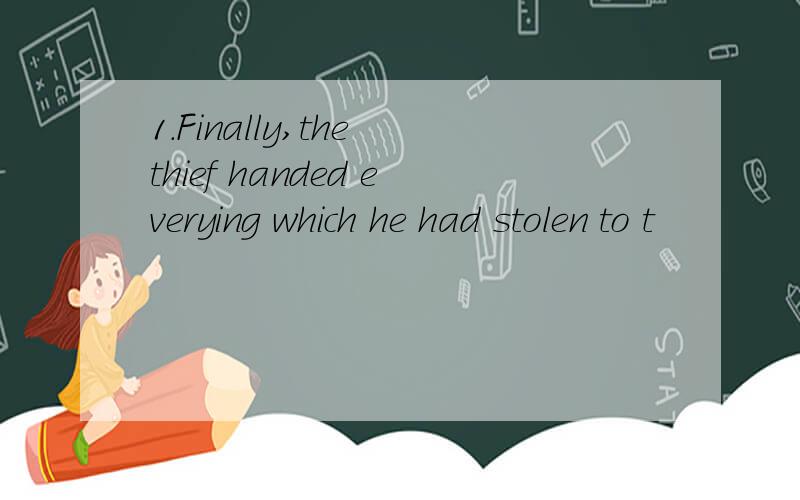1.Finally,the thief handed everying which he had stolen to t
来源:学生作业帮 编辑:大师作文网作业帮 分类:英语作业 时间:2024/11/17 23:02:28
1.Finally,the thief handed everying which he had stolen to the police.
2.In the dark street ,there wasn't a single person whom she could turn for help.
3.The person to who you spoke is a student of Grade One.
4.The weather turned out to be good,it was more than we could except.
5.It was been said above ,grammar is a set of dead rules.
2.In the dark street ,there wasn't a single person whom she could turn for help.
3.The person to who you spoke is a student of Grade One.
4.The weather turned out to be good,it was more than we could except.
5.It was been said above ,grammar is a set of dead rules.

1.which→that
everything做先行词时,关系代词用that不用which.
2.turn for help→turn to for help
固定短语turn to sb for help 转而向某人求助
3.to who→to whom
定语从句中,做介词宾语的关系代词如果和该介词一起提前至从句首时,则指人用whom,指物时用which.
4.it→which
两句间无连词并列时,则表明后者是定语从句,而代指整个主句的关系代词应该用which/as.
5.was→has
如果是一般过去时的被动语态,则been纯属多余;而从句意来看,用现在完成时的被动语态结构是最适合的.
everything做先行词时,关系代词用that不用which.
2.turn for help→turn to for help
固定短语turn to sb for help 转而向某人求助
3.to who→to whom
定语从句中,做介词宾语的关系代词如果和该介词一起提前至从句首时,则指人用whom,指物时用which.
4.it→which
两句间无连词并列时,则表明后者是定语从句,而代指整个主句的关系代词应该用which/as.
5.was→has
如果是一般过去时的被动语态,则been纯属多余;而从句意来看,用现在完成时的被动语态结构是最适合的.
1.Finally,the thief handed everying which he had stolen to t
Finally the thief handed everying( ) he had stolen to the po
Finally,the thief handed everything____he had stolen,to the
1,Finally,the thief handed everything____he had stolen,to th
Finally yhe thief handed everything _____he had stolen to th
finally,the thief handed everything __he had stolen to the p
Finallt,the thief handed everything _-which__he had stolen t
问句子 Finally,the theif handed everything __ he had stolen to
Finally,the thief handed everything ---he had stole to the p
The thief had to hand everything -------- he had stolen to t
The thief had to give everything [ ] he had stolen to the po
he handed everything( )he had picked up to the police.